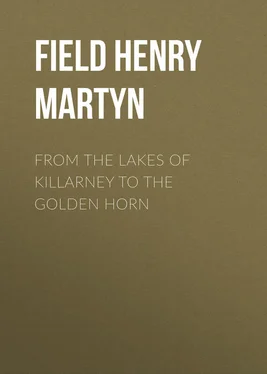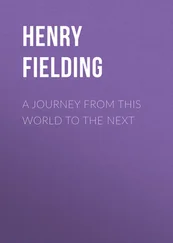Henry Field - From the Lakes of Killarney to the Golden Horn
Здесь есть возможность читать онлайн «Henry Field - From the Lakes of Killarney to the Golden Horn» — ознакомительный отрывок электронной книги совершенно бесплатно, а после прочтения отрывка купить полную версию. В некоторых случаях можно слушать аудио, скачать через торрент в формате fb2 и присутствует краткое содержание. Жанр: foreign_antique, foreign_prose, Путешествия и география, на английском языке. Описание произведения, (предисловие) а так же отзывы посетителей доступны на портале библиотеки ЛибКат.
- Название:From the Lakes of Killarney to the Golden Horn
- Автор:
- Жанр:
- Год:неизвестен
- ISBN:нет данных
- Рейтинг книги:5 / 5. Голосов: 1
-
Избранное:Добавить в избранное
- Отзывы:
-
Ваша оценка:
- 100
- 1
- 2
- 3
- 4
- 5
From the Lakes of Killarney to the Golden Horn: краткое содержание, описание и аннотация
Предлагаем к чтению аннотацию, описание, краткое содержание или предисловие (зависит от того, что написал сам автор книги «From the Lakes of Killarney to the Golden Horn»). Если вы не нашли необходимую информацию о книге — напишите в комментариях, мы постараемся отыскать её.
From the Lakes of Killarney to the Golden Horn — читать онлайн ознакомительный отрывок
Ниже представлен текст книги, разбитый по страницам. Система сохранения места последней прочитанной страницы, позволяет с удобством читать онлайн бесплатно книгу «From the Lakes of Killarney to the Golden Horn», без необходимости каждый раз заново искать на чём Вы остановились. Поставьте закладку, и сможете в любой момент перейти на страницу, на которой закончили чтение.
Интервал:
Закладка:
In the Free Church things are done with less of form and state than in the National Church, but there is intense life and rigor. I looked in upon their Assembly, but found it occupied, like the other, chiefly with those routine matters which are hastened through at the close of a session. But I heard from members that the year has been one of great prosperity. The labors of the American revivalists, Moody and Sankey, have been well received, and the impression of all with whom I conversed was that they had done great good. In financial matters I was told that there had been such an outpouring of liberality as had never been known in Scotland before. The success of the Sustentation Fund is something marvellous, and must delight the heart of that noble son of Scotland, Dr. McCosh.
I am disappointed to find that the cause of Union has not made more progress. There is indeed a prospect of the "Reformed" Church being absorbed into the Free Church, thus putting an end to an old secession. But it is a small body of only some eighty churches, while the negotiations with the far larger body of United Presbyterians, after being carried on for many years, are finally suspended, and may not be resumed. As to the National Church, it clings to its connection with the State as fondly as ever, and the Free Church, having grown strong without its aid, now disdains its alliance. On both sides the attitude is one of respectful but pretty decided aversion. So far from drawing nearer to each other, they appear to recede farther apart. It was thought that some advance had been made on the part of the Old Kirk, in the act of Parliament abolishing patronage, but the Free Church seemed to regard this as a temptation of the adversary to allure them from the stand which they had taken more than thirty years ago, and which they had maintained in a long and severe, but glorious, struggle. They will not listen to the voice of the charmer, no, not for an hour.
This attitude of the Free Church toward the National Church, coupled with the fact that its negotiations with the United Presbyterians have fallen through, does not give us much hope of a general union among the Presbyterians of Scotland, at least in our day. In fact there is something in the Scotch nature which seems to forbid such coalescence. It does not fuse well. It is too hard and "gritty" to melt in every crucible. For this reason they cannot well unite with any body. Their very nature is centrifugal rather than centripetal. They love to argue, and the more they argue the more positive they become. The conviction that they are right, is absolute on both sides. Whatever other Christian grace they lack, they have at least attained to a full assurance of faith. No one can help admiring their rugged honesty and their strong convictions, upheld with unflinching courage. They become heroes in the day of battle, and martyrs in the day of persecution; but as for mutual concession, and mutual forgiveness, that, I fear, is not in them.
It is painful to see this alienation between two bodies, for both of which we cannot but feel the greatest respect. It does not become us Americans to offer any counsel to those who are older and wiser than we; yet if we might send a single message across the sea, it should be to say that we have learned by all our conflicts and struggles to cherish two things – which are our watchwords in Church and State — liberty and union . We prize our liberty. With a great price we have obtained this freedom, and no man shall take it from us. But yet we have also learned how precious a thing is brotherly love and concord. Sweet is the communion of saints. This is the last blessing which we desire for Scotland, that has so many virtues that we cannot but wish that she might abound in this grace also. Even with this imperfection, we love her country and her people. Whoever has had access to Scottish homes, must have been struck with their beautiful domestic character, with the attachment in families, with the tenderness of parents, and the affectionate obedience of children. A country in which the scenes of "The Cotter's Saturday Night" are repeated in thousands of homes, we cannot help loving as well as admiring. Wherefore do I say from my heart, A thousand blessings on dear old Scotland! Peace be within her walls, and prosperity within her palaces!
CHAPTER IV.
MOODY AND SANKEY IN LONDON
To an American, visiting London just now, the object of most interest is the meetings of his countrymen, Moody and Sankey. He has heard so much of them, that he is curious to see with his own eyes just what they are. One thing is undeniable – that they have created a prodigious sensation. London is a very big place to make a stir in. A pebble makes a ripple in a placid lake, while a rock falling from the side of a mountain disappears in an instant in the ocean. London is an ocean. Yet here these meetings have been thronged as much as in other cities of Great Britain, and that not by the common people alone (although they have heard gladly), but by representatives of all classes. For several weeks they were held in the Haymarket Theatre, right in the centre of fashionable London, and in the very place devoted to its amusements; yet it was crowded to suffocation, and not only by Dissenters, but by members of the Established Church, among whom were such men as Dean Stanley, and Mr. Gladstone, and Lord-Chancellor Cairns. The Duchess of Sutherland was a frequent attendant. All this indicates, if only a sensation, at least a sensation of quite extraordinary character. No doubt the multitude was drawn together in part by curiosity. The novelty was an attraction; and, like the old Athenians, they ran together into the market-place to hear some new thing. This alone would have drawn them once or twice, but the excitement did not subside. If some fell off, others rushed in, so that the place was crowded to the last. Those meetings closed just before we reached London, to be opened in another quarter of the great city.
Last Sunday we went to hear Mr. Spurgeon, and he announced that on Thursday (to-day) Messrs. Moody and Sankey would commence a new series of meetings for the especial benefit of the South of London. A large structure had been erected for the purpose. He warmly endorsed the movement, and spoke in high praise of the men, especially for the modesty and tact and the practical judgment they showed along with their zeal; and urged all, instead of standing aloof and criticizing, to join heartily in the effort which he believed would result in great good. In a conversation afterward in his study, Mr. Spurgeon said to me that Moody was the most simple-minded of men; that he told him on coming here, "I am the most over-estimated and over-praised man in the world." This low esteem of himself, and readiness to take any place, so that he may do his Master's work, ought to disarm the disposition to judge him according to the rules of rigid literary, or rhetorical, or even theological, criticism.
This new tabernacle which has been built for Mr. Moody is set up at Camberwell Green, on the south side of the Thames, not very far from Mr. Spurgeon's church. It is a huge structure, standing in a large enclosure, which is entered by gates. The service was to begin at three o'clock. It was necessary to have tickets for admission, which I obtained from the Hon. Arthur Kinnaird, a Member of Parliament, who is about as well known in London as Lord Shaftesbury for his activity in all good works. He advised me to go early to anticipate the crowd. We started from Piccadilly at half-past one, and drove quietly over Westminster Bridge, thinking we should be in ample time. But as we approached Camberwell Green it was evident that there was a tide setting toward the place of meeting, which swelled till the crowd became a rush. There were half a dozen entrances. We asked for the one to the platform, and were directed some distance around. Arrived at the gates we found them shut and barred, and guarded by policemen, who said they had received orders to admit no more, as the place was already more than full, although the pressure outside was increasing every instant. We might have been turned back from the very doors of the sanctuary, if Mr. Kinnaird had not given me, besides the tickets, a letter to Mr. Hodder, who was the chief man in charge, directing him to take us in and give us seats on the platform. This I passed through the gates to the policeman, who sent it on to some of the managers within, and word came back that the bearers of the letter should be admitted. But this was easier said than done. How to admit us two without admitting others was a difficult matter; indeed, it was an impossibility. The policemen tried to open the gates a little way, so as to permit us to pass in; but as soon as the gates were ajar, the guardians themselves were swept away. In vain they tried to stem the torrent. The crowd rushed past them, (and would have rushed over them, if they had stood in the way,) and surged up to the building. Here again the crush was terrific. Had we foreseen it, we should not have attempted the passage; but once in the stream, it was easier to go forward than to go back. There was no help for it but to wait till the tide floated us in; and so, after some minutes we were landed at last in one of the galleries, from which we could take in a view of the scene.
Читать дальшеИнтервал:
Закладка:
Похожие книги на «From the Lakes of Killarney to the Golden Horn»
Представляем Вашему вниманию похожие книги на «From the Lakes of Killarney to the Golden Horn» списком для выбора. Мы отобрали схожую по названию и смыслу литературу в надежде предоставить читателям больше вариантов отыскать новые, интересные, ещё непрочитанные произведения.
Обсуждение, отзывы о книге «From the Lakes of Killarney to the Golden Horn» и просто собственные мнения читателей. Оставьте ваши комментарии, напишите, что Вы думаете о произведении, его смысле или главных героях. Укажите что конкретно понравилось, а что нет, и почему Вы так считаете.












